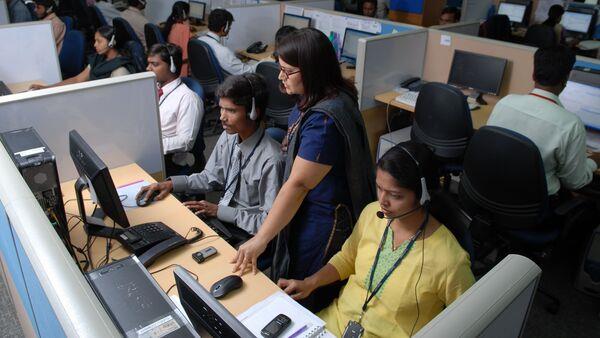
World Bank Urges Coordinated Action On Skills And Employment For India's $5 Trillion Economy Goal
“While globally true, in India, there is an overpowering narrative around skill education being for students who are weak and would have dropped out,” World Bank said in report tilted 'Jobs at Your Doorstep' released on Friday.“The result is that many students who want to or can benefit more from skill education than mainstream education run to conventional streams like arts, commerce or STEM (science, technology, engineering, mathematics).”
“Concerted efforts are needed towards rebranding skill education,” the report added.
Workers must develop complex problem-solving, teamwork and adaptability skills, said the report, stressing that job exposure should be offered during school years.
India faces a dual challenge of inadequate job creation and a skills gap among professionals entering the workforce, leading to rising unemployment and low employability rates.
World Bank stressed the importance of collaboration between governments, academic institutions, skill development bodies like the National Skill Development Corporation (NSDC) and Sector Skill Councils (SSCs), the private sector, civil society, and multilateral organizations to tackle the nation's employment and skills gap.
Also read | Centre-state budget talks, GST Council meet after Parliament session jobs, growth, urban consumption in focus
Experts reviewed youth employment opportunities across six states-Himachal Pradesh, Kerala, Madhya Pradesh, Maharashtra, Odisha, and Rajasthan-where the World Bank supports the Ministry of Education's Strengthening Teaching-Learning and Results for States (STARS) programme. They found that much of vocational skills training in India is largely rooted in traditional and hereditary practices and remains under-recognized by policymakers.
“Mainstreaming this non-formal training and connecting it with formal systems can be transformative. Many craftsmen, such as carpenters or metalworkers, acquire skills informally but lack exposure to modern practices like digital design or contemporary techniques,” said Bino Paul, professor at School of Management and Labour Studies, Tata Institute of Social Sciences, Mumbai.“Bridging this gap would not only enhance livelihoods but also preserve Indigenous knowledge."
The World Bank has identified nine critical challenges and areas for opportunity, including the expansion of skill education, a shift toward multi-skill training, leveraging local economies and skill hubs, focusing on employability alongside technical skills, improving hands-on learning infrastructure, and fostering stronger industry links. It also highlighted the need to change perceptions around skill education.
Workers must develop complex problem-solving, teamwork and adaptability skills, said the report, stressing that job exposure should be offered during school years.“To achieve the goals of India becoming a productive economy, she needs to urgently address challenges facing its employment landscape and prepare its workforce. Multifaceted, dynamic, convergent approaches aligned to educational reform and market-linked skill development (SD) will help India reach its job growth potential,” said Auguste Tano Kouame, country director (India) at the World Bank.
“Key reforms by the government of India will help strengthen the vocational education sector to become a decentralised, local market-led, inclusive, and fiscally sustainable sector, to train the workforce for the skills required for a high-income India,” he said.
Also read | IIM grads get a reality check in a tight job market
The government has launched various initiatives, including the Pradhan Mantri Kaushal Vikas Yojana (PMKVY-TI), the Employability Enhancement Training Programme (EETP), and the National Employability Enhancement Mission (NEEM). The Atmanirbhar Bharat Rojgar Yojana (ABRY) and Mahatma Gandhi National Rural Employment Guarantee Act (MGNREGA) also aim to tackle these issues.
The latest budget presented in July also allocated ₹1.48 trillion for education, employment, and skilling, with three new employment-linked Incentive schemes underscoring the government's commitment.
“Government schemes like PMKVY are promising, but more focus is needed to integrate traditional skills with formal education and entrepreneurship opportunities. This synergy could be a true game-changer for millions,” Paul said.
The government is considering expanding the age eligibility for the Prime Minister Internship Scheme to 18–25 years--a key platform for skilling and employment opportunities--up from the current 21–24 years, in a bid to offer more opportunities for candidates to apply and improve their chances of securing an internship.
And read | PM Internship Scheme may be opened to youth aged 18-25 to boost work experience opportunities
The scheme is open to applicants from families with an annual income of less than ₹8 lakh in 2023-24, provided no family member holds a permanent government job. The initiative offers over 125,000 internship opportunities across more than 20 sectors, facilitated by around 280 prominent companies.
Paul said the government should look into skilling as an opportunity for a confluence between traditional craft and formal sectors.“For instance, traditional craft-oriented people can now gain good knowledge about modern contemporary design systems through digital knowledge.” Legal Disclaimer:
MENAFN provides the
information “as is” without warranty of any kind. We do not accept
any responsibility or liability for the accuracy, content, images,
videos, licenses, completeness, legality, or reliability of the information
contained in this article. If you have any complaints or copyright
issues related to this article, kindly contact the provider above.

















Comments
No comment